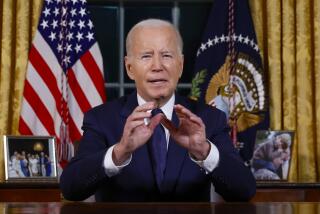Let the Moderates’ Revolution Begin : Congress: America’s global preeminence lies with those who promote a level playing field with foreign competitors.
With America’s choice for president a foregone conclusion, attention has turned to the outcome for the 105th Congress, which will be Bill Clinton’s partner in governing for the next two years. Nothing illustrates the importance of this more clearly than several crucial international choices this country will face in the coming months. Such choices, once peripheral to the average American, are now Main Street issues affecting the well-being of families nationwide.
In a few weeks, President Clinton will send a delegation to the first World Trade Organization ministerial in Singapore. Our trading partners will be watching the U.S. delegation carefully to determine whether the reelected president is likely to take the initiative to begin a new global round of trade negotiations. They also will be looking to see whether the U.S. will fully support the decisions of the WTO, which it was instrumental in creating, even when some of those decisions might stimulate political turbulence back home.
In December, the secretary of state will hold high-level talks in Beijing, carrying forward a crucial strategic dialogue initiated over the summer. These meetings will set the stage for a possible presidential visit to China during 1997 and will address a wide variety of issues of crucial importance to international economic and political stability.
In early February, President Clinton will meet with Chile’s President Eduardo Frei. The entire hemisphere will be watching to see whether America will reassume its essential leadership role in fulfilling the promise of the 1994 Miami Summit of the Americas to achieve free trade in the hemisphere by the year 2005. At that meeting, we and our NAFTA partners promised that Chile’s inclusion would be the top priority on the path to wider trade integration. Our inability to make progress on achieving a deal with this small country that poses no meaningful threat to America’s workers would cast doubt on our ability to proceed with the broader issues of integration with countries such as Brazil and Argentina.
Central to all of these trade-related issues is whether Congress grants the administration fast-track negotiating authority early next year. Proponents of such legislation have been waiting three years for the kind of broad authority Congress had traditionally granted Republican and Democratic presidents alike. Signals that such legislation will stall or be seriously limited will hamper America’s ability to continue bringing down global trade barriers even as foreign trading partners enjoy access to ours.
Also early in the year, U.S. business will be looking to see whether Congress continues to attempt to dismantle departments and agencies such as Commerce, the Export-Import Bank and the Overseas Private Investment Corp., which effectively level the playing field with our foreign competitors. The U.S. already spends less than our major competitors on the kind of financing and advocacy efforts that win deals and preserve or create American jobs.
As the federal budget is formulated, decisions will be made concerning funding for our operations in Bosnia, the Middle East, Haiti, the former Soviet Union and elsewhere. Cutting already small aid budgets will further limit the ability of the U.S. to extend its influence globally via nonmilitary means. Whether Republicans or Democrats are in the majority in the Senate or House will not tell us what outcomes can be expected in these areas. Members of both parties are sensible advocates of the progress and growth that come from promoting trade reform, a strategically crafted relationship with China or supporting our economy at home. But just as surely, there are leaders and followers in both parties who would deny and attempt to reverse the irreversible trends of globalization.
The real key to forecasting the future of America’s foreign policy will be to calculate how well the moderate center has fared in the face of the campaign rhetoric, PAC budgets and fear-mongering of extremists from Buchanan to Perot.
Fortunately, there is a sense that the extremist revolutions have failed in the eyes of the electorate. Now perhaps we can enter the Global Era on the wave of a common-sense revolution that will ensure American leadership, peace and prosperity.
More to Read
Get the L.A. Times Politics newsletter
Deeply reported insights into legislation, politics and policy from Sacramento, Washington and beyond. In your inbox three times per week.
You may occasionally receive promotional content from the Los Angeles Times.










